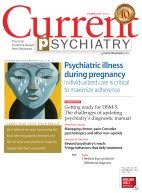Treating suicidal adolescents is fraught with challenges. Antidepressants may be associated with increased suicidal ideation in adolescents, although some data suggest that increased adolescent suicide rates are correlated with decreases in antidepressant prescribing. Adolescents hospitalized after a suicide attempt are likely to attempt suicide again after they are discharged. Such patients might not attend outpatient psychotherapy; a study of 167 adolescents discharged after a suicide attempt found that 26% never attended follow-up appointments and 11% went once.
Emerging research supports the effectiveness of dialectical behavior therapy (DBT) for suicidal adolescents. DBT is a form of cognitive-behavioral therapy that combines individual therapy, skills training, and telephone coaching and is implemented by a therapist consultation team that meets weekly. This article reviews evidence supporting the efficacy of DBT for suicidal adolescents and describes principles of outpatient DBT for these patients as developed by Miller et al.


No comments:
Post a Comment